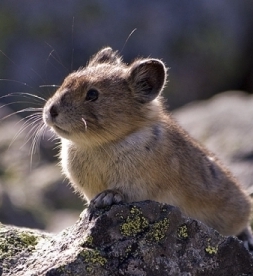Overview
 American Pika.
American Pika.
Pikas (Ochotona sp.) are small mammals related to rabbits that are found at mid to high elevations in North America and Eurasia. Specialized physiological and behavioral adaptations that enable pikas to tolerate cold environments also render them highly sensitive to warm temperatures. Vulnerability to warming coupled with relatively smaller land area available at higher elevations has raised concern for persistence of pikas and other montane small mammals in the face of climate change. The American pika (O. princeps) inhabits rocky mountain slopes of western North America. Limited information exists about climatic relationships of American pikas or other high-elevation mammals. Pikas have been petitioned for endangered species listing under federal and California state laws, increasing the urgency to:
- Inventory and map American pika populations;
- Monitor American pika population trends and status;
- Coordinate and expand knowledge of ecological and climate-impact science, and integrate American pika research with studies on other alpine mammals; and
- Develop and implement adaptation plans for the American pika
- 1st North American Pika Conference, March 25-27, 2010, Teton Science Schools, Jackson Hole, Wyoming
- Symposium: The American Pika's Capacity for Resilience in the Face of Climate Change, January 29, 2010, Western Section of TWS Annual Conference, Visalia, California
- World Lagomorph Society
- Mount Shasta Pika Project
- North American Pika Consortium
- American Pika Atlas at iNaturalist.org